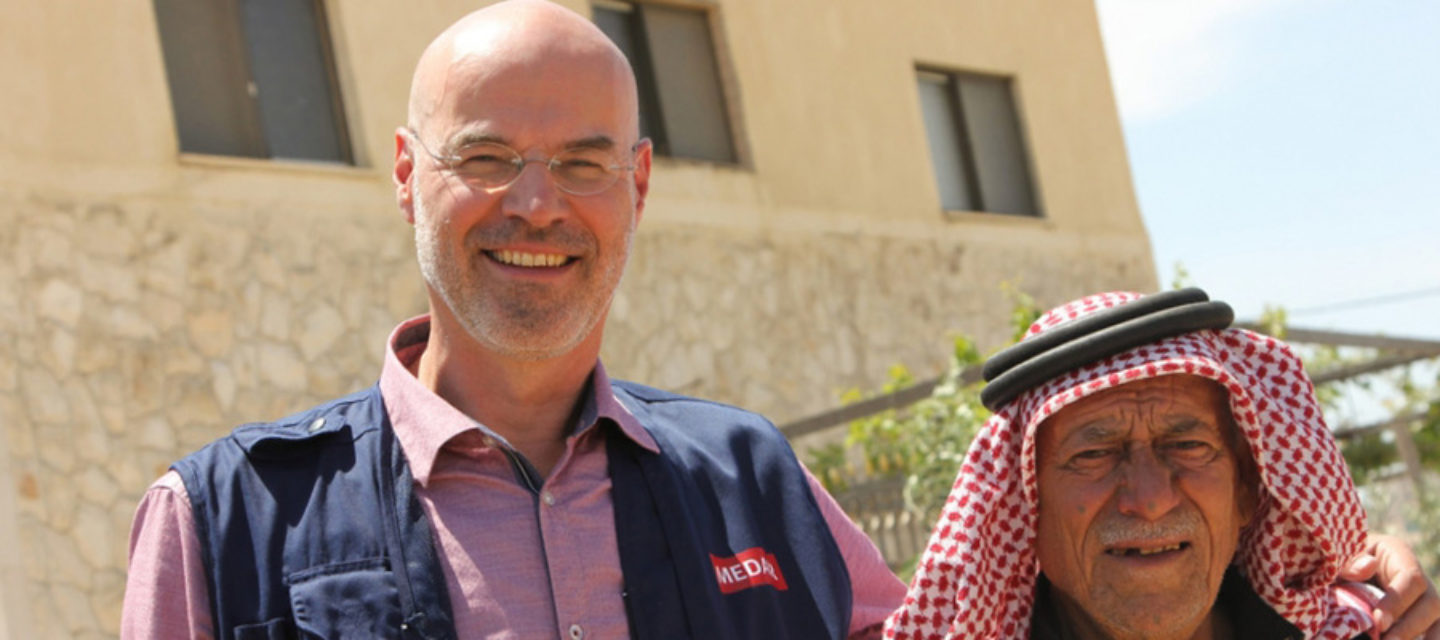Jordan Update: The Gift of Sight
Jordan Update: The Gift of Sight
 Read more
Read more
I recently made my first visit to the field as Medair’s new CEO, travelling to Amman, Jordan, on the first stop of my week-long visit to two countries in our Middle East Regional Programme.
Medair started working in Jordan in 2012. Six years later, we’re providing psychosocial support, unconditional cash transfers, and financial support for health care to Syrian refugee families and vulnerable Jordanians.
We’ve built our support in Jordan around the needs of the people we serve. In addition to the stresses of flight and life as a refugee, the cost of living is relatively high in Jordan. For families who are unable to work, covering costs like rent, health care bills, and debt payments can seem insurmountable. Medair’s cash programming ensures that vulnerable people are able to cover their most urgent needs.

My colleague Haneen and I met with a Syrian family whom Medair had supported. This family of 13 lived in a tent on the outskirts of Amman, and they welcomed us into their tent as though we were part of their family.

Back in Syria, Mohammed and Saadya had a farm and raised cows. Their life was comfortable and quiet, but when the Syria crisis reached their home, the whole family fled on foot with nothing more than the clothes they were wearing. Little Sara, now sitting comfortably beside me, was just four months old at the time. Her mother carried her all the way to Jordan. The youngest amongst them, Sara, was just four months old at the time. Her mother carried her all the way to Jordan.
Their life in this tent in Jordan is a stark contrast to what they had before. In addition to electric and water bills, Mohammed and Saadya must pay rent for the land on which their one tent stands. Nobody in the family has a work permit, and the family are deeply in debt.
When Mohammed and Saadya’s daughter Lena gave birth to her son Wael, now two months old, the family rushed her to a hospital in Amman. Wael was born with a respiratory illness, and spent 14 days in intensive care receiving life-saving medical support. The bill for the treatment came to JOD 4,000 (USD 5,600), and the hospital wouldn’t issue a birth certificate for Wael until the bill had been paid.

Our health team found out about Lena and her baby and covered the cost of the prohibitively expensive hospital bill. Wael is now safe at home with Lena and his very loving extended family. He has a birth certificate, ensuring that his rights as a person will be universally acknowledged.
As the family chats to me and my colleagues, I am struck by how much their lives have changed. Three years ago, this family lost everything in just the span of a few hours: their home, their livelihoods, the community they knew. Sitting in their tent, I am struck by their warmth and the stories they tell. They have lost everything, but they have not lost each other.
We serve families like Mohammed and Saadya’s every day, focusing our humanitarian work on building personal connections with the people and the communities we support.

Medair staff use tablet-based surveys to assess the needs of families and to track the support we provide. We use dashboards for improved monitoring. We partner and coordinate with other INGOs, local partners, and the UN, ensuring that together our activities reach the greatest number of people in need, without duplication. This approach ensures the work is high quality, innovative, and cost-efficient. Last year, we reached over 41,000 Syrians and Jordanians living in Jordan. Our work is not only emergency relief, but also recovery, to help Jordanians, Syrians, and other refugees to build a better future for their families.
The quality of our work shows not only for the people we serve, but also for the people who support our work. While in Jordan I had the honour of signing a funding agreement between Medair and the Swiss Agency for Development and Cooperation (SDC), a long-time partner of Medair in Jordan and many of our country programmes. SDC has just provided our programme in Jordan with another cash project, which will allow us to keep supporting vulnerable families in Jordan.

We invest in our humanitarian workforce to ensure the highest quality programming. Our Jordan team just hosted Medair national and international staff from seven country programmes for back-to-back trainings in project management and proposal development. My Jordanian colleague Haneen, who came with me to visit the families we serve, has been promoted twice – from project officer, to senior project officer, to health manager – since coming to Medair two years ago. Quality staff like Haneen are so important to the success of our projects as they are the primary contact with the people we serve.
Above all, our aim is to inspire hope in the people we serve, both now and in the future. Medair works in some of the most remote and devastated places in the world, where it seems that hope can be hard to find. The trip to Jordan reminded me that hope can be found anywhere if only you look hard enough: in the signing of a new grant, in the determination of my hard-working colleagues, and in the smile of a refugee child who has so little, but who is surrounded by people who love her.